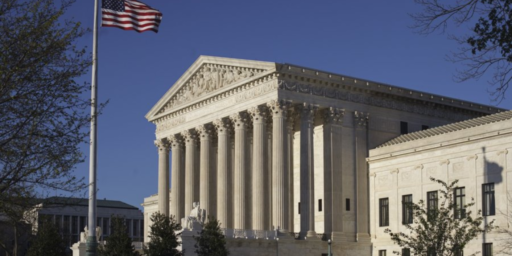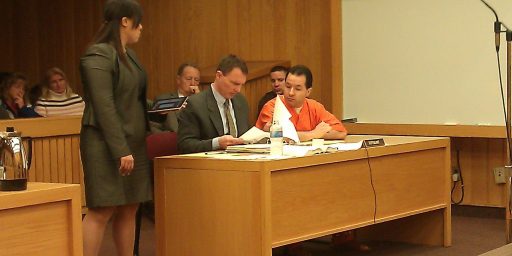Innocent Punished More Harshly Than Guilty
Daniel Solove explains why innocent people who are wrongly convicted are punished more harshly than guilty people rightly convicted:
1. The federal sentencing guidelines and sentencing guidelines in many states provides for reductions in sentences for “acceptance of responsibility.” The innocent defendant, who refuses to admit to the crime, will not receive this benefit.
2. An innocent defendant might often refuse to accept a guilty plea deal. When the innocent defendant defends his or her innocence at trial and gets wrongly convicted, that defendant will invariably receive a much higher punishment than that proposed in the plea deal.
3. An innocent defendant, by not admitting to his or her crime, might hurt his or her chance for an early release from prison.
These factors lead to the rather perverse outcome that defendants who are innocent are punished more harshly than the guilty. The innocent defendant faces a terrible choice — either falsely admit guilt, in exchange for a lighter punishment, or defend his or her innocence but pay dearly if he or she loses. Innocent defendants are probably much more likely to choose the latter strategy.
It’s the “Shawshank Redemption” scenario but one that often plays out in real life. While perverse and tragic, it’s not at all obvious how it can be fixed, short of barring plea bargaining and parole. The system very much incentivizes guilty pleas and parole boards, not unreasonably, operate on the presumption that the convict is guilty of the crime for which he’s incarcerated.






Though capital punishment generally treats the innocent and guilty alike.
It’s not the existence of plea bargains or the parole system in themselves that create the problem. It’s the fact that both those systems operate under rules that explicitly impose harsher punishments on those who assert their innocence.
The parole system is easiest to deal with: simply eliminate the admission of guilt as a permissible criterion for parole. Focus instead on the convict’s behavior while in prison – were they well-behaved?, did they take classes to learn skills or improve themselves?, are they in any way better now than when they went in? – and likelihood of success upon release – do they have a place to stay?, do they have a job waiting, or at least marketable skills? This would arguably actually improve the parole process, because it is currently influenced by an insanely perverse reliance on the prisoner’s own statement of guilt: the prisoner is credited for admitting guilt, and punished for denying it, which means that the guilty have an overwhelming incentive to lie and are often rewarded for doing so, while the only people you know are telling the truth are the ones who torpedo their own parole hearings with protestations of innocence, and those are the ones who get punished for it. Ignoring obviously coerced admissions of guilt in favor of objective behavior, as grounds for parole, would only improve things.
The plea bargain system is another matter. It is important to have an efficient means of processing cases through the system. It is simply impossible to hold a complete jury trial for every person arrested. But there is only an incentive to plead guilty without a trial if doing so will get you some kind of benefit in terms of a less serious charge or lower sentence – otherwise, you may as well take your chances at trial. Arguably, the plea bargain system results in higher conviction rates, but lower average sentences, for the trial system as a whole – a weird kind of win-win, if you consider only the actually guilty defendants. The problem, of course, is that the penalties for not cooperating in your own conviction are so harsh that even innocent defendants may find it attractive to falsely plead guilty rather than take even a small risk of a disastrous sentence. (A favorite tactic is to threaten the death penalty. Even if you were innocent and thought you could win at trial, how great a risk would you be willing to run if you knew you would be killed for losing? Add to this the fact that a plea bargain usually requires forfeiting the right to appeal, and you might be willing to take 10 or 20 years to avoid even, say, a 5% chance of a guaranteed death penalty.) But there’s no way to make the plea bargain system work without an incentive to cop the plea. Reducing the disparity in sentencing for non-pleading defendants would help, but it would also weaken the incentive to cop a plea in the first place, and thus undercut the entire plea bargain system – there’s no way to make the problem go away.
One possibility might be to limit plea bargains to the question of the charges laid rather than the penalty sought. Tell the defendant that they’ll get the standard penalty for whatever charge they’re convicted on, no matter what, but that they can plead down to a lesser charge. If they choose to go to trial, it will be on the harsher charge, but if they lose, the fact that they did not plead guilty will not be held against them. That would reduce the amount of pressure prosecutors could put on the guilty, it’s true, but also shift the defendant’s decision-making to the question whether they really are willing to stand trial on the charge in question, which I think is appropriate. But there is no solution to the plea bargain problem that is as clean as the available solution to the parole problem.
Often? Really?
Often? Really?
Probably not that often, but it sure is a despicable outcome when it does occur. For all the “got off on a technicality” baloney most people assume to be true, anybody that knows much about the judicial system knows well that the deck is stacked against any defendant who choses to go to trial. The judge, the prosecutor and, yes, the jury all think of themselves as being on the same team.
Justice in is the property of the wealthy. If you are innocent but cannot afford lawyer, then you are totally screwed! Public defender? Only if you stay in jail. If you can afford bail then the courts say you can afford a lawyer so you will not get court appointed council. I lost everything I had in life to prove I was innocent. In the end a verdict of not guilty was only a moral victory, I had nothing left. If you ask any police officer, prosecutor or judge, they will all tell you that there has never been an innocent person falsely accused on their watch.
I can agree it is awful when it happens without thinking we have to throw the baby out with the bathwater. The perfect remains the enemy of the good. I doubt that humans can do much better than pretty good when it comes to justice, given our nature. Does that mean we quit trying?
Anecdotal horror stories tend to be the exceptions that prove the rule.
Charles, Randall brings up the only point I could think of to add to this post… Unfortunatly it is not as rare as I (we) would like to think.
A friend of mine was a Fed PD in E. St.Louis for years.(she gave up after 7 yrs) With out getting into too many more anedotal stories, all one needs to do is compare the funding of PD offices, and the funding of DA’s offices.
Even the MO Chief Justice agrees. (while her slant has a “law and order” tilt to it, keep in mind, that even here, she has to run for re-election) one should be aware that there is no “law” if there is no “order”.
There is “Justice” and there is “just us”. I have seen way too little of the former in a court of law, and have seen way too much of the latter in the same courts.
Seriously, how often do we think this happens? What percentage of convicts are actually innocent of the charge? And what percentage of those found innocent are actually guilty?
I would believe that the rate of the former is much lower than the rate of the latter. But I’m curious if anyone has ever estimated these numbers.
Not only is the perfect the enemy of the good, but IMO our courts’ priority should be determining the truth, not protecting people’s rights.
Houston, I have no idea… there is no such thing as “innocence” in a court of law (that is a concept that has no legal foundation) There is only “Guilty” and “Not Guilty”. Seriously, in the entire history of the American legal system, NOBODY has ever been found “innocent”.
Considering how much Johnny Cochran must have cost… What are we really measuring in a court of law? (I could mention MANY others)
So:
I can only say that as one who has sat thru a multitude of arraignment hearings, it does not take a rocket scientest to tell who is “adequately” represented,or not. I can also say this much for certain: The rocket scietists don’t have to worry about it as much as us the rest of us.